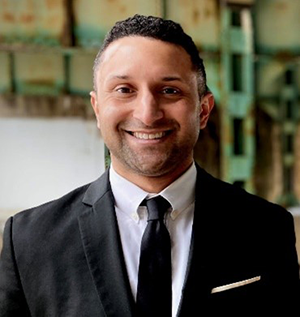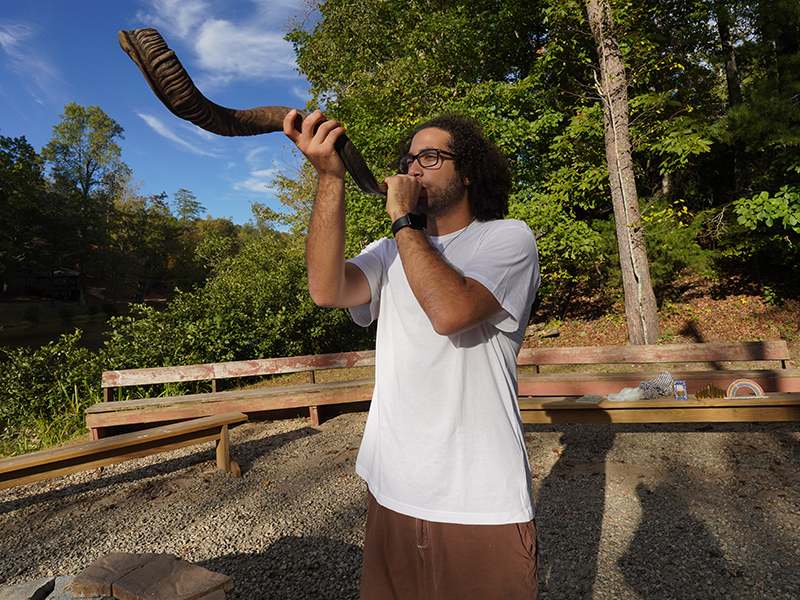In Jewish thought, many know the as the watchword prayer of our faith: "Listen, people of Israel, Adonai is our God and Adonai is One" (Deuteronomy 6:4). We say it every morning and night and it's placed inside the frame of our doorways on our scrolls. It says who we are as a people in relationship to God. If there's a watchword prayer that summarizes our beliefs, what is the watchword law of Judaism? We see such a law in K'doshim, which contains laws aimed at helping people live holy lives.
In the ethical laws about how we treat each other, we see some of my favorite verses in all of the Torah: "Love your neighbor as yourself," and "When strangers reside with you in your land, you shall not wrong them. The strangers who reside with you shall be to you as your citizens; you shall love each one as yourself." (Leviticus 19:18, 33-34).
There's a joke within rabbinical circles that every week, the rabbi gives the same sermon, but on a different topic. In other words, we interpret the Torah through our own filter. For the rabbi who is passionate about social justice, their sermons always veer toward social justice. I'll be the first to admit that I do the same. All of my sermons seem to be about empathy.
In these verses, I see the entirety of Torah. I often preach about sensible immigration reform. That message couldn't be clearer here. I've organized what I call a "Temple Ambassador" program at my synagogue, making special name tags for congregants to introduce themselves to visitors. That call to make people feel welcome is in these verses. I reference them when I remind people that the Israelites were vulnerable and depended on the kindness of strangers when we entered Egypt. Imagine how vulnerable it feels to walk into a synagogue and not look like anyone in the room.
If you grew up only around people who looked like you, were in the same class, had the same interests, and had the same religion, it can be a challenge to not see everyone else as "the other." It's only natural that human beings relate to people like themselves. But can we challenge that? Can we see the commonalities beyond our own color, class, ability, gender, and other identities?
I grew up with a spectacular blessing: diversity in my day-to-day life. I grew up in a Black neighborhood in Baltimore, raised by my Black father and white mother. Most of my teachers were Black and my dad's mother and sisters were my babysitters. We lived paycheck to paycheck. This was in stark contrast when visiting my mom's family in New York, who lived rather upper middle-class lives. That diversity became my superpower. Neither wealthy, poor, Black, or white felt foreign to me. I could easily find myself in whoever I met. They were all my people.
Every person is a child of God. Every person can be part of your people. When I meet people who seem foreign, I remember that person is a fellow soul on this planet and equal.
In Acharei Mot, we read about the kohanim placing their hands on a goat on Yom Kippur and confessing all the sins of the people. The goat would absorb those iniquities and be set free into the wilderness, purging the people of their sins.
In modern times, we recite the (confession) prayer throughout the High Holidays. I invite you to make your own Vidui list. Take this list, hold it to your heart, acknowledge it, see your biases, and commit to going forward differently. Perhaps you can make this part of your practice on Rosh Hashanah?
Even as a member of the clergy who is a Person of Color, I am not exempt from doing this work. I've looked at a person experiencing homelessness and avoided them. I've spoken with a service person who had a thick accent and gotten aggravated because I had a hard time understanding them. I've assumed someone wasn't a doctor because they weren't a white man. I have work to do. I need to do better.
Something that I've been focusing on recently is developing positive relationships with people who are fundamentally different from me. My biggest hurdle in loving my neighbor as myself is finding a way to love people who don't share my social and political values. But as God is my witness, I'm going to commit to making the time to get to know these people. I will find our commonalities and where we can agree.
The Sh'ma was the prayer Mom sang to me every night before I fell asleep. As it is for countless Jews, it will always be my watchword prayer. But as an adult, I've realized that my personal watchword has to encompass a bigger scope. My personal watchword has to take me out of my personal experience, and I have to embrace the world, even when it's messy, confusing, and uncomfortable.
The times in my life that I've grown the most is when I've found myself in discomfort. I've had to make myself comfortable within those spaces. I found myself in a "narrow space" and had to create an "open and safe space" for myself and others. This world will improve when we do this difficult work. I'm going to endeavor not to see this work as simply "difficult work," but "holy work."
Explore Jewish Life and Get Inspired
Subscribe for Emails


